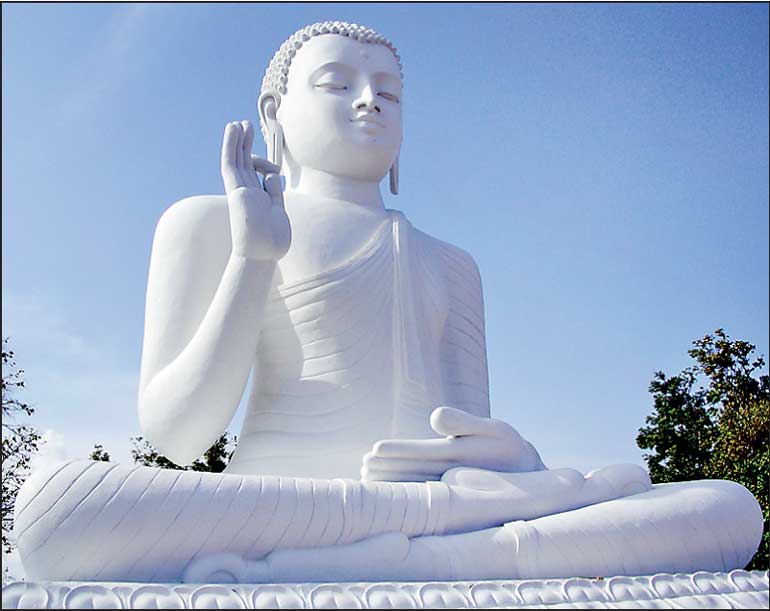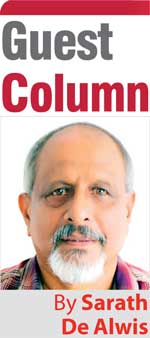Wednesday Feb 18, 2026
Wednesday Feb 18, 2026
Wednesday, 7 June 2023 00:20 - - {{hitsCtrl.values.hits}}

The Buddha did not demand blind allegiance. His path is that of reason, critical thinking, and free inquiry
 Politics of paranoia confronts politics of dialogue. All around us, there is a frighteningly outlandish carnival in full swing.
Politics of paranoia confronts politics of dialogue. All around us, there is a frighteningly outlandish carnival in full swing.
We’re trying to rationalise our way out of a situation where we’ve been made to believe that we have no choice but meek acquiescence with the arsonists who set the house on fire who now claim that they are expert fire fighters.
Our basic freedoms are under constant and calculated assault. Pied pipers and charlatans are on a ceaseless parade vilifying all dissent.
Our desperate need as a plural democratic society for critical thinking and free inquiry is the point of departure of this agonisingly gruelling essay.
There is another pressing need for me to examine the foundational premises of the concept of critical thinking. In the past one year I have been bored ad nauseum by the refrain “If not this man, who else can pull us out of this mess?”
These are well mannered ‘chic’ people who despite inflation still manage three meals per day and possess those wonderful energy saving inverter refrigerators with neat shelves and large doors that snugly fit in to fastidious pantries. Such people don’t need critical thinking. Their preconceptions rule out free inquiry.
This essay concerns ordinary people who face extraordinary times with stoical resolve to change the system.
Galileo Galilei
On 15 February 1564, Galileo Galilei was born into a world which had no telescopes. A spectacle maker in the Netherlands invented the first telescope. The spirit of free inquiry and critical thinking enabled Galileo Galilei to perfect the telescope that enabled mankind to locate the place of the earth in the cosmos. Having discovered the ‘truth’ he now had to defend it. He produced a scientific treatise with exceptional literary elan called “Dialogue Concerning the Two Chief World Systems: Ptolemaic and Copernican.”
In it he demonstrated the validity of the Copernican system. It was reprinted by the University of California press with a forward by Albert Einstein.
Einstein in his 20th century forward to Galileo’s 1632 masterpiece writes: “A man is here revealed who possesses the passionate will, the intelligence, and the courage to stand up as the representative of rational thinking against the host of those who, relying on the ignorance of the people and the indolence of the teachers in priest’s and scholar’s garb, maintain and defend their positions of authority. His unusual literary gift enables him to address the educated men of his age in such clear and impressive language as to overcome the anthropocentric and mythical thinking of his contemporaries.”
But we must see what Galileo Galilei himself has to say about those who condemned him.
“In the long run my observations have convinced me that some men, reasoning preposterously, first establish some conclusion in their minds which, either because of its being their own or because of their having received it from some person who has their entire confidence, impresses them so deeply that one finds it impossible ever to get it out of their heads. Such arguments in support of their fixed idea as they hit upon themselves or hear set forth by others, no matter how simple and stupid these may be, gain their instant acceptance and applause. On the other hand, whatever is brought forward against it, however ingenious and conclusive, they receive with disdain or with hot rage — if indeed it does not make them ill. Beside themselves with passion, some of them would not be backward even about scheming to suppress and silence their adversaries.”
When I read this particular passage of this Great Italian astronomer written in the 16th Century I couldn’t help recalling the recent humbug dispensed by the self-styled legal pundit of the current dispensation.
Long before Galileo Galilei commented on petty minds who attempted to thwart reason and critical thinking with preposterous arguments the Buddha enunciated his charter of free inquiry and critical thinking.
In his classic work “What the Buddha Taught” Venerable Dr. Walpola Rahula explains how it all began. “The Buddha, whose personal name was Siddhartha, and family name Gautama, lived in North India in the 6th century B.C. His father Suddhodana, was the ruler of the kingdom of the Sakyas (in modern Nepal). His mother was queen Maya.
According to the custom of the time, he was married quite young, at the age of 16, to a beautiful and devoted young princess named Yasodahara.
The young prince lived in his palace with every luxury at his command. But all of a sudden, confronted with the reality of life and the suffering of mankind, he decided to find the solution – the way out of this universal suffering.
At the age of 29, soon after the birth of his only child, Rahula, he left his kingdom and became an ascetic in search of his solution. For six years the ascetic Gautama wandered about the valley of Ganges, meeting famous religious teachers, studying and following their systems and methods, and submitting himself to rigorous ascetic practices.
They did not satisfy him. So he abandoned all traditional religions and their methods and went his own way.
It was thus that one evening, seated under a tree (since then known as the Bodhi – or Bo-tree, the “Tree of Wisdom”), on the bank of the river Neranjara at Buddha-aya (near Gaya in modern Bihar), at the age of 35, Gautama attained enlightenment, after which he was known as the Buddha, ‘The Enlightened One’.
In these dark times of sanctimonious humbug, the passage was reproduced purely to demonstrate the distilled truth of renunciation and detachment that is intrinsic to what the Buddha taught.
Now we come to the Buddha’s charter of free inquiry. In these dark days of deceit it is best that we reproduce the Buddha’s dictates on free inquiry and critical thinking in the words of the Scholar Monk Walpola Rahula Maha Thera.
“He (the Buddha) said that there was no esoteric doctrine in his teaching, nothing hidden in the ‘closed-fist of the teacher’, or to put it in other words, there never was anything ‘up his sleeve’.
The freedom of thought allowed by the Buddha is unheard of elsewhere in the history of religions. This freedom is necessary because, according to the Buddha, man’s emancipation depends on his own realisation of Truth, and not on the benevolent grace of a god or any external power as a reward for his obedient good behaviour.
The Buddha once visited a small town called Kesaputta in the kingdom of Kosala.
The inhabitants of this town were known by the common name Kalama.
When they heard that the Buddha was in their town, the Kalamas paid him a visit, and told him: “Sir, there are some recluses and brahmapas who visit Kesaputta. They explain and illumine only their own doctrines, and despise, condemn, and spurn others’ doctrines. Then come other recluses and brahmapas, and they, too, in their turn, explain and illumine only their own doctrines, and only despise, condemn and spurn others’ doctrines. But, for us, Sir, we have always doubt and perplexity as to who among these venerable recluses and brahmapas spoke the truth, and who spoke falsehood.”
Do not be led by reports, or tradition, or hearsay
Then the Buddha gave them this advice, unique in the history of religions: “Yes, Kalamas, it is proper that you have doubt, that you have perplexity, for a doubt has arisen in a matter which is doubtful. Now, look you Kalamas, do not be led by reports, or tradition, or hearsay. Be not led by the authority of religious texts, nor by the delight in speculative opinions, nor, by seeming possibilities, nor by the idea: ‘this is our teacher.’ But O Kalamas, when you know for yourselves that certain things are unwholesome (akusala), and wrong, and bad, then give them up... And when you know for yourselves that certain things are wholesome (kusala) and good, then accept them and follow them.” The Buddha went even further. He told the bhikkhus that a disciple should examine even the Tathagata (Buddha) himself, so that he (the disciple) might be fully convinced of the true value of the teacher whom he followed.
So dear Reader, the Buddha did not demand blind allegiance. His path is that of reason, critical thinking, and free inquiry.
The true Buddhist mind employs critical thinking at all times. It has to be so because compassion and selflessness are important aspects of Buddhism. If there is no critical thinking the process of compassion is flawed.
In the fifties and sixties Sri Lanka witnessed a process of politicisation of religion. Post civil war triumphalism of the Rajapaksa clan unleashed a shameless process of religionisation of politics.
The true Buddhist mind should and must be open to new ideas and new discoveries.
If we are to meaningfully integrate with the global value chain, we need our youth to be critical thinkers and more importantly with a healthy sense of humour.
Such enterprising curious minds capable of practice critical thinking will be willing to give up their old ideas and embrace the new.
Both critical thinking and Buddhist philosophy promote the idea of being open to new ideas and new things. People who practice true critical thinking are willing to give up their own old ideas. That is the Buddhist idea of detachment.
Astrophysicist and philosopher Carl Sagan once said: “Science is more than a body of knowledge. It’s a way of thinking, a way of sceptically interrogating the universe with a fine understanding of human fallibility.”
We don’t have to wait till 2048 to adopt critical thinking and free inquiry. I know how young people think. I have five grand daughters and a grandson.